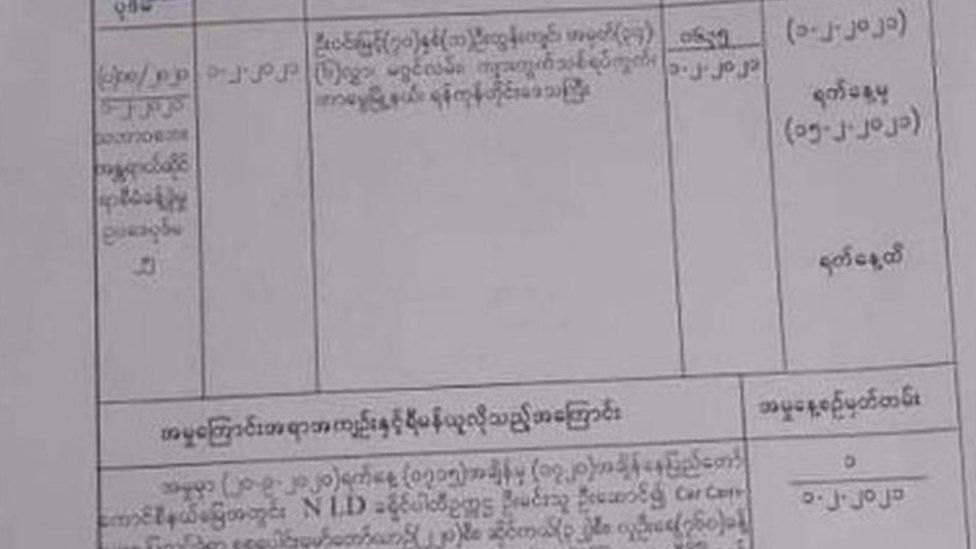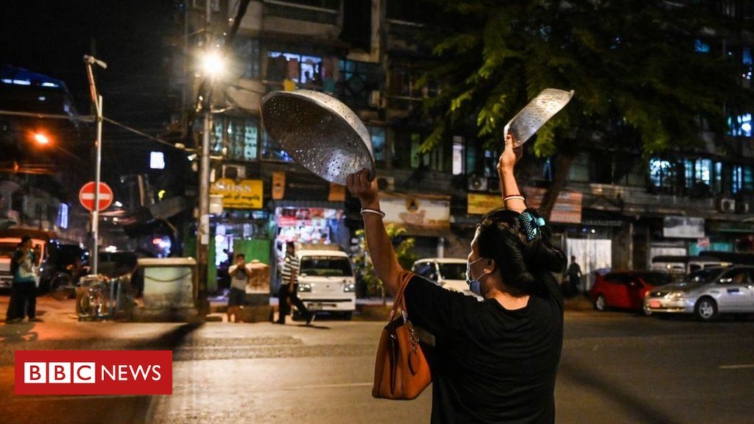
Audio By Carbonatix
Myanmar's military rulers have blocked access to Facebook, days after they overthrew the democratic government.
Officials said the social media platform - for many in Myanmar the only access to the internet - would be blocked for the sake of "stability".
Facebook has become a key rallying point for opposition to Monday's coup.
In further civil disobedience, lawmakers are refusing to leave their compound in the capital, and more pot-banging was seen in Yangon.
What is Facebook's role?
The Ministry of Communications and Information said access to Facebook would be blocked until 7 February. However, it was still reported to be accessible sporadically.
Anthony Aung, who runs a tour agency in Yangon, the main city, told the BBC at one point he still had access to the site through WiFi but not cellular data.
He said "people around me are all rushing to download alternative apps and VPN" - virtual private networks which allow users to get round internet restrictions.
Hours later, Mr Aung said Facebook had stopped working completely.
Half of Myanmar's 53 million people use Facebook and activists have set up a page to co-ordinate opposition to the coup.
The company allows its app to be used without data costs in Myanmar as a way of avoiding expensive telecoms data charges.
The social media giant acknowledged the disruption, saying "we urge authorities to restore connectivity so that people in Myanmar can communicate with their families and friends and access important information".
Telecoms company Telenor Myanmar, which is part of the Norwegian Telenor Group, said it would comply with the order to block Facebook, but suggested in a statement that this breached human rights law.
What is happening on the streets?
Reports from Myanmar's second city, Mandalay, say there was a small demonstration and some arrests.
In the main city, Yangon, residents banged cooking pots for a second night running in a sign of protest.
At least 70 lawmakers are refusing to leave a government guest house in the capital, Nay Pyi Taw, and have declared what they are calling a new parliamentary session, BBC Burmese reports.
The MPs belong to the National League for Democracy (NLD) led by Aung San Suu Kyi - the elected civilian leader overthrown and then arrested in the coup. The military filed charges against her and the deposed President Win Myint on Wednesday.

The lawmakers are among hundreds who were confined by the military to guest houses before being told they were free to leave.
The streets are for the most part calm with no sign of major protest and a curfew in force.
However, hospitals have seen protests. Many medics have either stopped work, or continued while wearing symbols of defiance to oppose the suppression of Myanmar's short-lived democracy.
'Absolutely unacceptable'
The UN secretary general, António Guterres, has meanwhile called for constitutional order to be re-established in Myanmar - also known as Burma. He said he hoped there would be unity in the Security Council on the matter.
"We'll do everything we can to mobilise all the key actors of the international community to put enough pressure on Myanmar to make sure that this coup fails," he said.
"It's absolutely unacceptable to reverse the result of the elections and the will of the people.
"I hope that it'll be possible to make the military in Myanmar understand that this is not the way to rule the country and this is not the way to move forward."
Western countries have condemned the coup unreservedly, but efforts at the Security Council to reach a common position failed as China dissented. China is one of five permanent members with a right of veto in the council.
Beijing has long played a role of protecting the country from international scrutiny, and has warned since the coup that sanctions or international pressure will only make things worse.
Alongside Russia, it has repeatedly protected Myanmar from criticism at the UN over the military crackdown on the Muslim minority Rohingya population.
Suu Kyi's whereabouts still unclear
Ms Suu Kyi is reported to be held at her residence in the capital.
The charges against her include breaching import and export laws, and possession of unlawful communication devices - walkie-talkies used by her security staff.
The accusations are contained in a police document - called a First Initial Report - submitted to a court.

She was remanded in custody "to question witnesses, request evidence and seek legal counsel after questioning the defendant", the document says.
President Win Myint is accused, under the National Disaster Management Law, of meeting supporters in a 220-vehicle motorcade during the election campaign in breach of Covid restrictions.
The coup, led by armed forces chief Min Aung Hlaing, has seen the installation of an 11-member junta.
Latest Stories
-
Adom FM’s ‘Strictly Highlife’ lights up La Palm with rhythm and nostalgia in unforgettable experience
15 minutes -
Ghana is rising again – Mahama declares
5 hours -
Firefighters subdue blaze at Accra’s Tudu, officials warn of busy fire season ahead
6 hours -
New Year’s Luv FM Family Party in the park ends in grand style at Rattray park
6 hours -
Mahama targets digital schools, universal healthcare, and food self-sufficiency in 2026
6 hours -
Ghana’s global image boosted by our world-acclaimed reset agenda – Mahama
6 hours -
Full text: Mahama’s New Year message to the nation
6 hours -
The foundation is laid; now we accelerate and expand in 2026 – Mahama
6 hours -
There is no NPP, CPP nor NDC Ghana, only one Ghana – Mahama
6 hours -
Eduwatch praises education financing gains but warns delays, teacher gaps could derail reforms
7 hours -
Kusaal Wikimedians take local language online in 14-day digital campaign
7 hours -
Stop interfering in each other’s roles – Bole-Bamboi MP appeals to traditional rulers for peace
8 hours -
Playback: President Mahama addresses the nation in New Year message
8 hours -
Industrial and Commercial Workers’ Union call for strong work ethics, economic participation in 2026 new year message
10 hours -
Crossover Joy: Churches in Ghana welcome 2026 with fire and faith
10 hours

